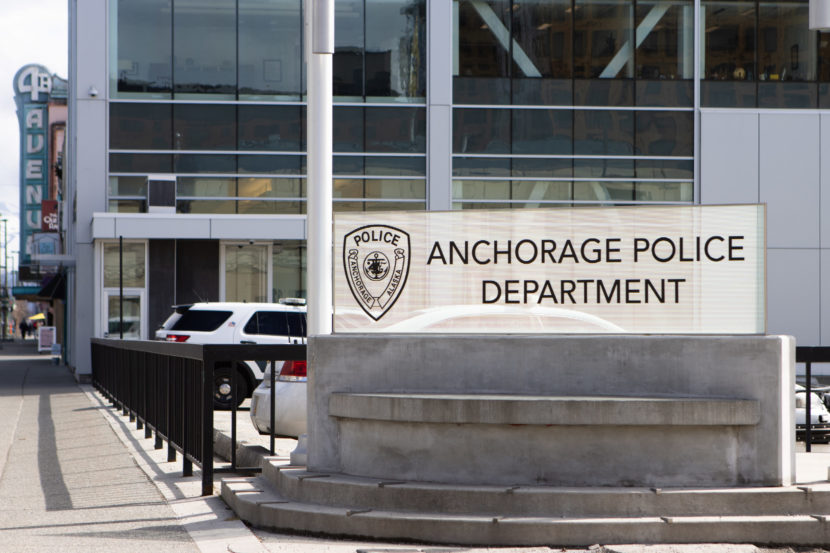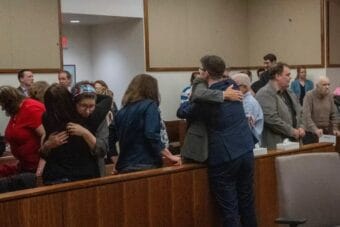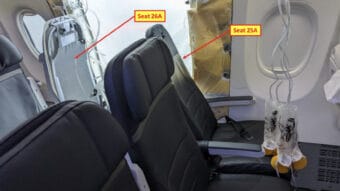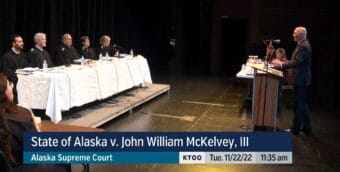
The family of a man from a northwest Alaska village say the Anchorage Police Department failed to fully investigate his death after he was found naked and dead on a beach in Anchorage, .
Fred Lee was a heavy equipment operator, father of four and basketball coach from Buckland. Anchorage police say the 41-year-old’s death in June was not criminal in nature, and the department has closed its investigation. But Lee’s family disagrees, saying the suspicious circumstances warrant a closer look.
That’s according to the Anchorage Daily News and their reporter Michelle Theriault Boots, who’s been following the case.
Theriault Boots says Lee’s friends and family — while protesting and demanding that police reopen the case — have begun an investigation of their own.
Listen:
The following transcript has been lightly edited for clarity.
Michelle Theriault Boots: It seemed impossible to them that he could have gotten by himself from the Spenard Road area to this very remote place accessible only by trail. And then there was just a huge question of, how did he die? You know, he was naked, he didn’t have any of his stuff, his backpack, his clothes, and his back was covered in these deep scratches, all over his back and torso. But his feet and his lower body looked like they hadn’t been touched, which they thought was odd, if he had walked for, you know, six-plus miles, walked through brush and forest, to this place where he was found dead.
Casey Grove: Tell me about the last time anybody saw Fred alive.
Michelle Theriault Boots: So, Fred and his wife had been in Anchorage, and they had been staying at the Spenard Motel. And they had apparently decided, kind of in the middle of the night, that that was no longer a place that they wanted to be. And they were going to walk down the road to the Chelsea Inn Hotel, which is also on Spenard Road. Fred’s wife peeled off to go pick up a cellphone she had left at a relative’s house, and Fred went on walking alone towards the Chelsea Inn Hotel. He never checked in there. So he was missing for over 24 hours. His family pretty quickly realized he was missing because he missed a flight. And so they mobilized, and there were multiple cars full of relatives scouring Anchorage for him, driving all over town looking for him. No one saw a trace of him.
Casey Grove: What did his wife tell you about kind of his state when she saw him last?
Michelle Theriault Boots: She said that he had been drinking a bit but was not heavily intoxicated. Other than that, there were not indications that he was in any kind of upset or distressed state. I think it was more like they were mobilizing to get back on the plane and fly home. They were getting ready to travel.
Casey Grove: OK, so what has the Anchorage Police Department told you about this? And what have they not told you about it? And I guess what are some of the questions they haven’t answered?
Michelle Theriault Boots: Yeah, the Anchorage Police Department has said very little about this. They said that they investigated it and found the death to be noncriminal. They would not say why. And then when the medical examiner report came out, they did something very unusual, which they almost never do, and they shared the cause of death. And the medical examiner found that the cause of death was a combination of factors associated with methamphetamine use, including something called ketosis, which is a metabolic problem, and then pneumonia. So they ruled the death as accidental, but that is not a legal designation, that is a medical designation. A finding that a death is noncriminal is completely separate. That’s something that only police do. That’s pretty much what we know from police about it. They do say they took statements from all witnesses, including the people who found Fred’s body on the beach. I spoke to one man who heard a scuffle in the woods or an aggressive conversation or aggressive talking in the woods very near where Fred’s body was found, less than an hour before the body was found. And that man, Stephen Fisher, expressed some real frustration with the Anchorage Police Department, because he says that he offered and offered his story because he felt it might be important to an investigation and that he was, you know, outright rebuffed, told no. And that conversation didn’t end in a friendly way with police. And he said, “Fine, I’ll just go talk to the family,” which he did.
Casey Grove: So this has blown up into some controversy now, with the family saying that the Anchorage Police Department hasn’t looked into these suspicious circumstances, this witness that says that the police didn’t talk to him about this conversation, this aggressive talking that he heard. What is the family left with at this point?
Michelle Theriault Boots: They held a rally and a march to the Anchorage Police Department several days ago, about 45, 50 people showed up for that. And they want police to reopen the case. And for lack of that, they’re doing it themselves. And that’s really the takeaway that, you know, this family has mobilized with this Facebook page, they’re talking to witnesses, they’re trying to track down surveillance footage. What will come of all that? Who knows. But the family is certainly continuing to work to try to find out what what happened to Fred Lee and how this beloved father and son from Buckland was found dead on this beach in Anchorage.
Casey Grove: It’s certainly tragic, no matter which way you look at it. But I guess in the larger context, too, do you think that this case has maybe resonated with more people because a lot of folks, a lot of Alaska Native folks, don’t think that law enforcement agencies investigate the disappearance of Indigenous people? Is that, you know, a take that you have on that?
Michelle Theriault Boots: I think that, definitely, placing this case in the larger context of the crisis of missing and murdered Indigenous people in Alaska. That’s, I think, where some of the frustration comes in for the family and the community there. To them there are these glaring signs that foul play happened here. It seems clear to them that this case at least warrants further investigation. And I think for them to hear that witnesses were told, “We’re not really interested in what you have to say,” is very frustrating and hurtful and, you know, another reason why they’re continuing to hold protests and continuing to investigate this on their own.



